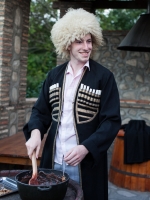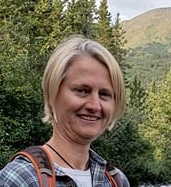Educator Workshops 2021

Creating Cultureful Classrooms with Peer Tutors and Live Experiences
February 26 (Friday) @ 10:45-12:00 ET
Working Language: English
Led by: Panel discussion with several experienced educators.
Whether a language, history, literature, foreign policy or culture class – you can bring your content to life through people and places from across the ocean. Four panelists will share their experiences with using Russian chat partners and live virtual excursions.
Learn about how these tools help students gain confidence and cross the language barrier, understand cultural nuances, reinforce and animate historical concepts and create motivation to learn, study abroad, and build cross-cultural relationships. We’ll discuss advantages, challenges, and best practices for implementing these opportunities into a classroom.
Panelists:
“Peer Tutoring Fosters Autonomous Motivation for FL Learning: Evidence from Russian Classroom Project”
Tanya Ivanova-Sullivan, Associate Professor of Russian, University of New Mexico
“Teaching Russian through Film: Peer Tutor Support via Zoom and Flipgrid”
Evgenia Wilkins, Lecturer, UT-Austin
“Live Streaming Russian History: Interactive Field Trips in Russian Language and History Courses”
Marina Alexandrova, Senior Lecturer, UT-Austin
“An Hour Abroad: Enhancing the Classroom through Virtual Excursions & Conversations”
Ona Renner-Fahey, University of Montana, Associate Professor of Russian

The Language of Identity
March 20 (Saturday) @ 12:00pm-1:00pm ET
OR March 26 (Friday) @ 11:00am-12:00pm ET.
Working Language: Russian
Led by: Liubov Proskurina, PhD, who has taught Russian as a foreign language for over 20 years. She has 35 publications in Ukrainian and foreign scientific journals.
During the workshop we’ll discuss questions that often result in both predictable and unpredictable reactions among today’s students and some instructors. How do we approach and talk with students about what is sometimes seen as inherent “sexism” in the Russian language? How do we handle the issues of gender identification, nationality and race when speaking and teaching Russian? Finally, we’ll take a look at those elements of Russian grammar and vocabulary that may be perceived as controversial and often require additional explanation. This interactive workshop allows us to discuss these challenging but important questions and share experience and opinions on the topic with colleagues.
(На семинаре предлагается обсудить вопросы, которые часто вызывают как прогнозируемую, так и непрогнозируемую реакцию у современных студентов, а также некоторых преподавателей: так называемый «сексизм» в русском языке, и как говорить об этом со студентами, проблемы гендерной идентификации по-русски, определение национальности и расы. Будут рассмотрены элементы русской грамматики и лексики, которые неоднозначно воспринимаются и часто требуют дополнительного объяснения преподавателя.)


